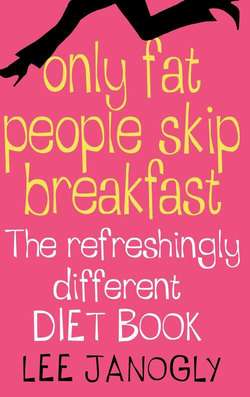Читать книгу Only Fat People Skip Breakfast: The Refreshingly Different Diet Book - Lee Janogly - Страница 33
Media Pressure
ОглавлениеThe media doesn’t help. Editors of women’s magazines are constantly under pressure to come up with news about dieting to feed their readers’ presumably insatiable desires for weight-loss advice. Although some of these magazines are cautious and thorough in their approach to nutrition reporting, a ‘diet breakthrough’ is just too hard to resist writing about—as the editors will tell you, they have to give the readers what they want!
You will have seen countless articles in magazines saying ‘Diets Don’t Work’ followed, 20 pages later, by a ‘Get Slim for Summer’ feature. Everyone who reads the message that diets don’t work resists it. You cling to the belief that you can find a way to make one work. Look at all those ‘before’ and ‘after’ pictures of people who have tried to lose weight for those beach photos. Surely if it works for them it will work for you. (Secret: what the magazine didn’t tell you is that the people in the ‘after’ pictures didn’t make it through to ‘Still Slim in Spring’, and neither will you.)
Some writers are paid by product companies to place promotional articles in magazines. The pressure on editors to fill their magazine content every month with new stories can lead to reporters and feature writers falling back on ‘press-release journalism’, which means they will simply reproduce material sent to them by PR companies—and every magazine editor is bombarded with press releases all the time eulogizing new products and services for their readers.
The press release may sound scientific, or may even be issued from a reputable university or research institute. The ‘experts’ quoted, however, may have some financial interest in the product they are promoting, or might even influence the editor by placing a full-page advert for the product in the magazine.
To enhance readers’ interest, the magazine will list famous people who apparently swear by the stuff. In recent years it must seem as though Geri Halliwell, Liz Hurley and Madonna are the recipients of every weight-loss and beauty aid invented!
What about adverts you see or hear on radio or television? How objective are they? When food manufacturers sponsor television programmes, how much could they, or do they, influence the content of that programme? Do we even think about it when we see the logos come up and hear ‘this programme is brought to you by’ or ‘in association with’? In one country, a well-known fast-food manufacturer even sponsors the news bulletins on one channel. Now how much critical comment are you going to get about junk food from that television station?
Newspapers and magazine editors and makers of lifestyle programmes for radio and television know that dieters love to hear the latest scientific discoveries. This audience, however, is not looking for the latest news about a cure for cancer; they just want to read that someone has invented a lettuce that tastes of chocolate. Editors and programme-makers therefore owe it to all of us to ensure that their stories about ‘diet breakthroughs’ are informed with broad research and deep scepticism—but don’t hold your breath for that.
